七年级牛津版深圳专版学生双语报4期
(2021年整理)牛津深圳版七年级下Unit4Savethetrees单元练习含答案
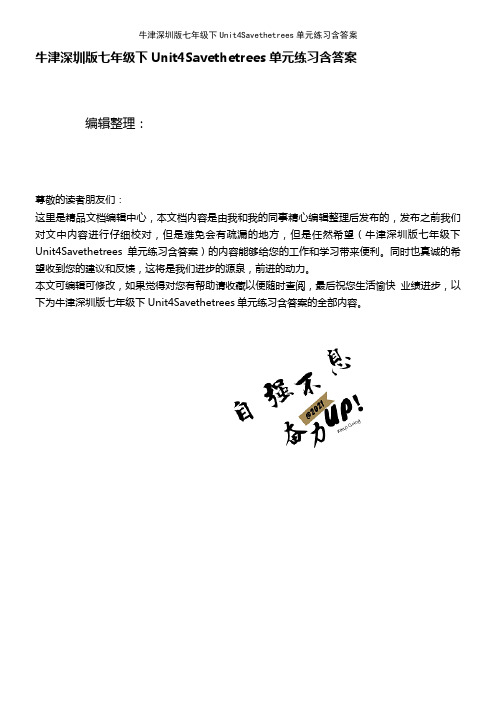
牛津深圳版七年级下Unit4Savethetrees单元练习含答案编辑整理:尊敬的读者朋友们:这里是精品文档编辑中心,本文档内容是由我和我的同事精心编辑整理后发布的,发布之前我们对文中内容进行仔细校对,但是难免会有疏漏的地方,但是任然希望(牛津深圳版七年级下Unit4Savethetrees单元练习含答案)的内容能够给您的工作和学习带来便利。
同时也真诚的希望收到您的建议和反馈,这将是我们进步的源泉,前进的动力。
本文可编辑可修改,如果觉得对您有帮助请收藏以便随时查阅,最后祝您生活愉快业绩进步,以下为牛津深圳版七年级下Unit4Savethetrees单元练习含答案的全部内容。
初中英语牛津深圳版七年级下册Unit4 Save the trees单元练习一、听力(听力)(共20小题;共20分)(略)二、单项选择(共10小题;共10分)21。
Look! Jack and his monkey flying disk together in the garden。
A. is playing B。
was playing C. are playing D. were playing22。
My mother is cakes。
She often cakes for us。
A。
makes; making B. making; makes C。
does; doing D. doing; does23。
-—- she her homework?-—- No, she isn't. She is writing something。
A. Does; doB. Is; doingC. Do; doD. Are; doing24. --- Listen! Who in the music room?—-— It must be Jane. She usually at this time every day.A。
学生双语报n深版七年级答案
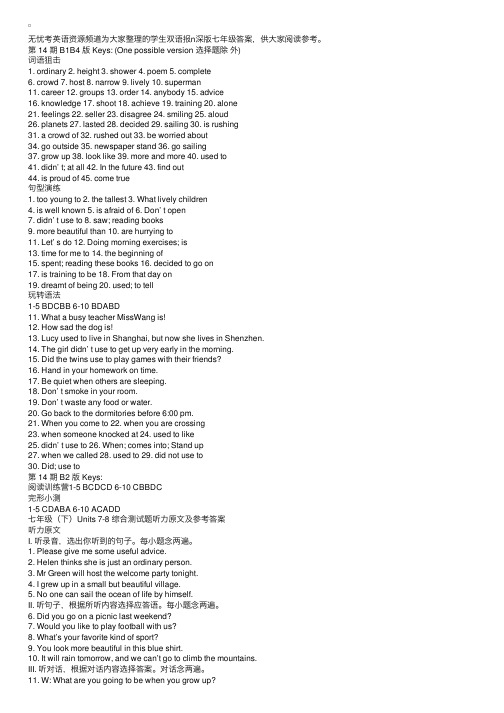
⽆忧考英语资源频道为⼤家整理的学⽣双语报n深版七年级答案,供⼤家阅读参考。
第 14 期 B1B4 版 Keys: (One possible version 选择题除外)词语狙击1. ordinary2. height3. shower4. poem5. complete6. crowd7. host8. narrow9. lively 10. superman11. career 12. groups 13. order 14. anybody 15. advice16. knowledge 17. shoot 18. achieve 19. training 20. alone21. feelings 22. seller 23. disagree 24. smiling 25. aloud26. planets 27. lasted 28. decided 29. sailing 30. is rushing31. a crowd of 32. rushed out 33. be worried about34. go outside 35. newspaper stand 36. go sailing37. grow up 38. look like 39. more and more 40. used to41. didn’ t; at all 42. In the future 43. find out44. is proud of 45. come true句型演练1. too young to2. the tallest3. What lively children4. is well known5. is afraid of6. Don’ t open7. didn’ t use to 8. saw; reading books9. more beautiful than 10. are hurrying to11. Let’ s do 12. Doing morning exercises; is13. time for me to 14. the beginning of15. spent; reading these books 16. decided to go on17. is training to be 18. From that day on19. dreamt of being 20. used; to tell玩转语法1-5 BDCBB 6-10 BDABD11. What a busy teacher MissWang is!12. How sad the dog is!13. Lucy used to live in Shanghai, but now she lives in Shenzhen.14. The girl didn’ t use to get up very early in the morning.15. Did the twins use to play games with their friends?16. Hand in your homework on time.17. Be quiet when others are sleeping.18. Don’ t smoke in your room.19. Don’ t waste any food or water.20. Go back to the dormitories before 6:00 pm.21. When you come to 22. when you are crossing23. when someone knocked at 24. used to like25. didn’ t use to 26. When; comes into; Stand up27. when we called 28. used to 29. did not use to30. Did; use to第 14 期 B2 版 Keys:阅读训练营1-5 BCDCD 6-10 CBBDC完形⼩测1-5 CDABA 6-10 ACADD七年级(下)Units 7-8 综合测试题听⼒原⽂及参考答案听⼒原⽂I. 听录⾳,选出你听到的句⼦。
七年级配合牛津版深圳专版第4期答案(1)
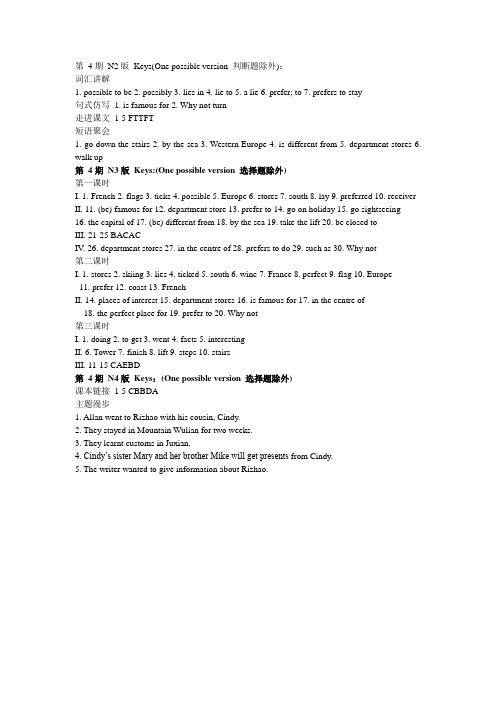
第4期N2版Keys(One possible version 判断题除外):词汇讲解1. possible to be2. possibly3. lies in4. lie to5. a lie6. prefer; to7. prefers to stay句式仿写1. is famous for 2. Why not turn走进课文1-5 FTTFT短语聚会1. go down the stairs2. by the sea3. Western Europe4. is different from5. department stores6. walk up第4期N3版Keys:(One possible version 选择题除外)第一课时I. 1. French 2. flags 3. ticks 4. possible 5. Europe 6. stores 7. south 8. lay 9. preferred 10. receiver II. 11. (be) famous for 12. department store 13. prefer to 14. go on holiday 15. go sightseeing 16. the capital of 17. (be) different from 18. by the sea 19. take the lift 20. be closed toIII. 21-25 BACACIV. 26. department stores 27. in the centre of 28. prefers to do 29. such as 30. Why not第二课时I. 1. stores 2. skiing 3. lies 4. ticked 5. south 6. wine 7. France 8. perfect 9. flag 10. Europe11. prefer 12. coast 13. FrenchII. 14. places of interest 15. department stores 16. is famous for 17. in the centre of18. the perfect place for 19. prefer to 20. Why not第三课时I. 1. doing 2. to get 3. went 4. facts 5. interestingII. 6. Tower 7. finish 8. lift 9. steps 10. stairsIII. 11-15 CAEBD第4期N4版Keys:(One possible version 选择题除外)课本链接1-5 CBBDA主题漫步1. Allan went to Rizhao with his cousin, Cindy.2. They stayed in Mountain Wulian for two weeks.3. They learnt customs in Juxian.4. Cindy’s sister Mary and her brother Mike will get presents from Cindy.5. The writer wanted to give information about Rizhao.。
(学生双语报第05期)广东省深圳市宝安区上寮学校七年级英语下册 Unit 4能力测试题(无答案) 牛津版

(学生双语报第05期)广东省深圳市宝安区上寮学校七年级英语下册 Unit 4能力测试题(无答案)牛津版听力部分(20分)I.听录音,选出你听到的句子。
每小题念两遍。
(共5个小题,每小题1分)( ) 1. A. I have already watered the trees.B. I have already watered the flowers.C. I haven't watered the trees yet.( ) 2. A. Leaves make food for people.B. Leaves turn yellow in autumn.C. Leaves turn green in spring.( ) 3. A. The seed will become an apple tree.B. The seed will become an orange tree.C. The seed will become a pear tree.( ) 4. A. My grandpa likes to drink green tea.B. My grandma likes to drink black tea.C. My grandpa likes to drink white tea.( ) 5. A. She looks very pretty in that hat.B. She looks very pretty in that dress.C. She looks very pretty in that skirt.II.听句子,根据所听内容选择最佳应答语。
每小题念两遍。
(共5个小题,每小题1分)( ) 6. A. Yes, I have.B. Yes, I'd love to.C. No, thank you.( ) 7. A. Yes, he can.B. Yes, he is.C. Yes, he does.( ) 8. A. They are roots.B. Roots are very useful.C. Bring water for the trees.( ) 9. A. I'm hungry.B. To the school.C. I don't think so.( ) 10. A. Vegetables.B. I like meat, too.C. Meat, please.Ⅲ.听对话,根据对话内容选择最佳答案。
七年级报纸电子版·深圳版(第4期)
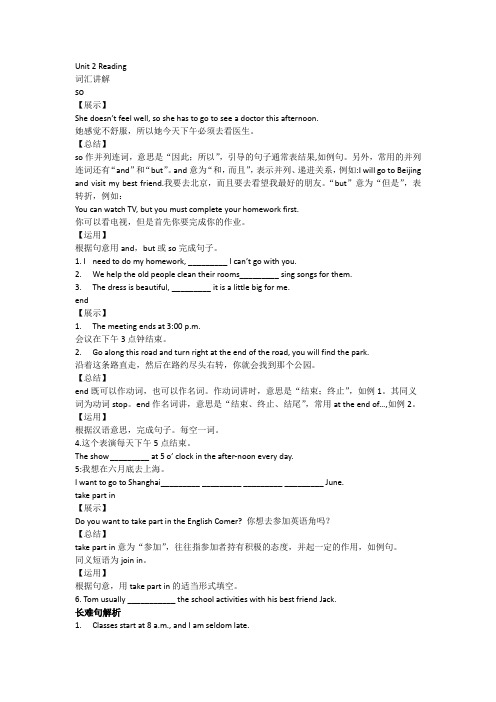
Unit 2 Reading词汇讲解so【展示】She doesn’t feel well, so she has to go to see a doctor this afternoon.她感觉不舒服,所以她今天下午必须去看医生。
【总结】so作并列连词,意思是“因此;所以”,引导的句子通常表结果,如例句。
另外,常用的并列连词还有“and”和“but”。
and意为“和,而且”,表示并列、递进关系,例如:I will go to Beijing and visit my best friend.我要去北京,而且要去看望我最好的朋友。
“but”意为“但是”,表转折,例如:You can watch TV, but you must complete your homework first.你可以看电视,但是首先你要完成你的作业。
【运用】根据句意用and,but或so完成句子。
1. I need to do my homework, _________ I can’t go with you.2. We help the old people clean their rooms_________ sing songs for them.3. The dress is beautiful, _________ it is a little big for me.end【展示】1. The meeting ends at 3:00 p.m.会议在下午3点钟结束。
2. Go along this road and turn right at the end of the road, you will find the park.沿着这条路直走,然后在路约尽头右转,你就会找到那个公园。
【总结】end既可以作动词,也可以作名词。
作动词讲时,意思是“结束;终止”,如例1。
其同义词为动词stop。
end作名词讲,意思是“结束、终止、结尾”,常用at the end o f…,如例2。
学生双语报答案七年级牛津深圳专版
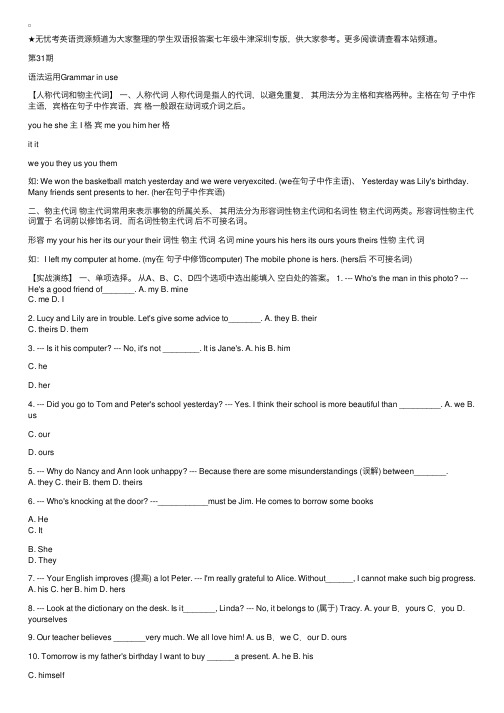
★⽆忧考英语资源频道为⼤家整理的学⽣双语报答案七年级⽜津深圳专版,供⼤家参考。
更多阅读请查看本站频道。
第31期语法运⽤Grammar in use【⼈称代词和物主代词】⼀、⼈称代词⼈称代词是指⼈的代词,以避免重复,其⽤法分为主格和宾格两种。
主格在句⼦中作主语,宾格在句⼦中作宾语,宾格⼀般跟在动词或介词之后。
you he she 主 I 格宾 me you him her 格it itwe you they us you them如: We won the basketball match yesterday and we were veryexcited. (we在句⼦中作主语)、 Yesterday was Lily's birthday. Many friends sent presents to her. (her在句⼦中作宾语)⼆、物主代词物主代词常⽤来表⽰事物的所属关系、其⽤法分为形容词性物主代词和名词性物主代词两类。
形容词性物主代词置于名词前以修饰名词,⽽名词性物主代词后不可接名词。
形容 my your his her its our your their 词性物主代词名词 mine yours his hers its ours yours theirs 性物主代词如:I left my computer at home. (my在句⼦中修饰computer) The mobile phone is hers. (hers后不可接名词)【实战演练】⼀、单项选择。
从A、B、C、D四个选项中选出能填⼊空⽩处的答案。
1. --- Who's the man in this photo? ---He's a good friend of_______. A. my B. mineC. meD. I2. Lucy and Lily are in trouble. Let's give some advice to_______. A. they B. theirC. theirsD. them3. --- Is it his computer? --- No, it's not ________. It is Jane's. A. his B. himC. heD. her4. --- Did you go to Tom and Peter's school yesterday? --- Yes. I think their school is more beautiful than _________. A. we B. usC. ourD. ours5. --- Why do Nancy and Ann look unhappy? --- Because there are some misunderstandings (误解) between_______.A. they C. theirB. them D. theirs6. --- Who's knocking at the door? ---___________must be Jim. He comes to borrow some booksA. HeC. ItB. SheD. They7. --- Your English improves (提⾼) a lot Peter. --- I'm really grateful to Alice. Without______, I cannot make such big progress.A. his C. herB. him D. hers8. --- Look at the dictionary on the desk. Is it_______, Linda? --- No, it belongs to (属于) Tracy. A. your B.yours C.you D. yourselves9. Our teacher believes _______very much. We all love him! A. us B.we C.our D. ours10. Tomorrow is my father's birthday I want to buy ______a present. A. he B. hisC. himselfD. him⼆、根据句意,选⽤合适的⼈称代词和物主代词填空,使句⼦通顺。
学生双语报官网学生双语报答案集锦

[标签:标题]篇一:学生双语报七年级上册英语报纸答案2014-2015学年上学期七年级配合牛津版深圳专版第21期测试题答案七年级英语Unit6能力测试题参考答案听力部分I-IV. 1-5ABCBB 6-10CABCA11-15BAACA 16-20BCABC笔试部分(One possible version选择题除外)I. 1-5BACABII. 6. Asia 7. area 8. building9. natural 10. outsideIII. 11-15BBABC16-20BACBCIV. 21. a 22. friends 23. having24. are 25. them 26. And27. minutes 28. come 29. open30. goes V. 31-35BCBCC 36-40ACBCAVI. 41-45BDCCB 46-50DABDC51-55ACBBBVII. 56. places of interest 57. in the centre of 58. light up 59. in the north-west of 60. more than VIII.Shenzhen is a beautiful city. There are many theme parks in Shenzhen. Many people like having fun in these parks. If you like swimming, you can come to Shenzhen because there are many beautiful seas. If you like going shopping, you can also come to Shenzhen. There are many large shops in Shenzhen. You can enjoy different kinds of delicious food in Shenzhen too.【书面表达写作指导】本次书面表达要求介绍美丽的深圳市。
牛津深圳初中英语七年级上册Unit 4 Seasons Period 3精品课件
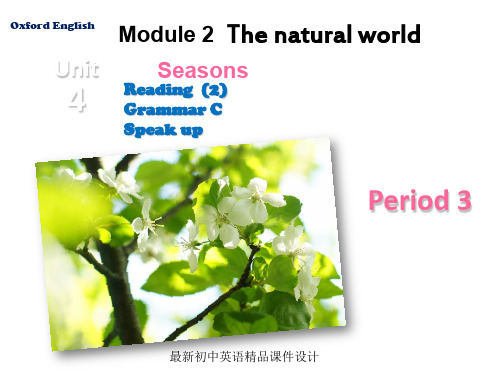
Try to use these adjectives to make a sentence with the
above structure.
最新初中英语精品课件设计
Reading comprehension
D1 Find sentences beginning with It is … from the article on page 45 to go with these pictures.
Spring
In spring, the weather starts to get warm. The wind blows gently. It often rains. Plants start to grow. Everything turns green. It is exciting to take a trip in spring.
brown
interestin g
cold cool dry
excitin g
nice red snowy warm
gree n
wet
hot
yello w
最新初中英语精品课件设计
Grammar C
Adjectives with It is and to + a verb
We can use the adjectives below with It is and to followed by a verb.
interesting It is good to meet ant is hard to answer these difficult questions. It is important to stay young at heart.
N深版学生双语报七年级下册
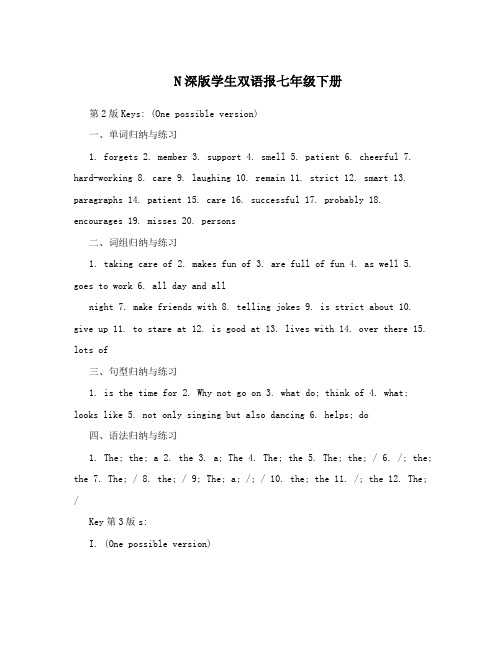
N深版学生双语报七年级下册第2版Keys: (One possible version)一、单词归纳与练习1. forgets2. member3. support4. smell5. patient6. cheerful7. hard-working8. care9. laughing 10. remain 11. strict 12. smart 13. paragraphs 14. patient 15. care 16. successful 17. probably 18. encourages 19. misses 20. persons二、词组归纳与练习1. taking care of2. makes fun of3. are full of fun4. as well5. goes to work6. all day and allnight 7. make friends with 8. telling jokes 9. is strict about 10. give up 11. to stare at 12. is good at 13. lives with 14. over there 15. lots of三、句型归纳与练习1. is the time for2. Why not go on3. what do; think of4. what; looks like5. not only singing but also dancing6. helps; do四、语法归纳与练习1. The; the; a2. the3. a; The4. The; the5. The; the; /6. /; the; the7. The; /8. the; / 9; The; a; /; / 10. the; the 11. /; the 12. The; /Key第3版s:I. (One possible version)1. support2. strict3. care4. forget5. encourages6. miss7.smell 8. hard-working 9. cheerful 10. smartII. (One possible version)11. all day and all night 12. take care of 13. make fun of 14. tell jokes 15. are strict aboutIII. 16-20 ABADC 21-25 ACCAB 26-30 BACCAIV. 31-35 DAACB 36-40 BACDCV. 41-45 ACBDBVI. (One possible version)46. smoking 47. waiting 48. to study 49. to take 50. to join 51. telling 52. patient 53. successful 54. paragraphs 55. members VII. (One possible version)My English teacherLinda is my favorite teacher. She teaches us English. She looks very beautiful. She is tall andthin with long black hair. She always smiles at everyone. I like her classes very much. Her classes are very interesting because she often uses lots of games in her teaching. Besides, she often tells jokes to us and makes us laugh. She is very strict about our studies. She is also kind and patient. She always encourages us and gives us support when we are in trouble. So she gets on well withus. I like Linda very much.【书面表达写作指导】本次书面表达要求介绍自己的英语老师。
七年级牛津(SZY)2014-2015 第4期
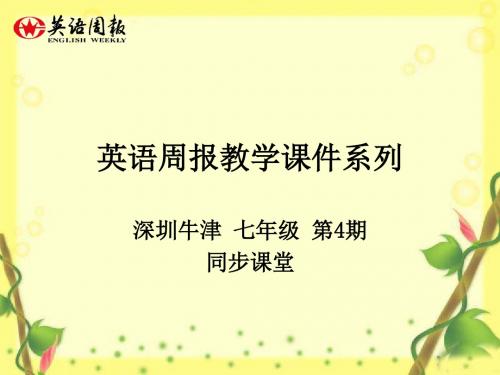
第二版 知识点滴
love可与like互换使用。如: Most elderly love / like going / to go for a walk after supper. 大多数老人喜欢晚饭后去散步。 ♥enjoy 意为“喜欢;享受”,其后面接动词 ing 形式,构成句型enjoy doing sth,意为 “喜欢做某事;喜爱做某事”。如: My mother enjoys singing very much. 我妈妈非常喜欢唱歌。
第二版 短语收藏夹
3. 我每周去图书馆一两次。 once _____ or _____ twice I go to the library _____ a week _____ ______. 4. 孩子们在假期通常都过得很愉快。 have _____ a _____ good Children usually _____ time holidays. _____in 5. 李叔叔天天走路上班。 on _____ foot Uncle Li goes to work _____ every day.
第二版 知识点滴
【温馨提示】 在汉语中,我们常将“因为”和“所以”搭 配使用。但在英语中,so 和because 不能 同时出现在一个句子里,即表示原因的句子 用了because,表示结果的句子就不能再用 so。 ♥on foot 意为“步行”,是固定短语。go to ... on foot 意为“步行去……”,可与 walk to ... 互换使用。如: She often goes to school on foot. = She often walks to school. 她经常步行去上学。 第二版 知识点滴
英语周报教学课件系列
深圳牛津 ; Learning 教与学
牛津深圳版英语七年级下册Module 4Unit7A poem(共16张PPT)

Enjoy the song again
Papa, papa, when shall we travel far? Taking my telescope to see the star. Baby, baby, taking the map you drew. Follow me do as I do.
Step 2
Write the verse
Use the example below to help you.
Make it a poem
Put your verse into the poem on page 99. Don’t forget to give a title to the poem.
Homework
1. 在上节课的任务表中再选择两项任务完成,但不 能与之前一天重复。
2. 完成《练习册》第108页Writing的练习。
Read and guess
3
Presentation
Read the
Let another Exchange the
poem (4)
group read score with
1 the poem(22) group X 3
Surprise (2)
4
Surprise
Read the
(2)
poem(4) 5
Work out the rules
A poem means a piece of writing in which the words are arranged in lines , and four lines form a verse , often ending in rhyme . (Words are chosen for their sound and for their images and ideas as rhyme.)
牛津深圳初中英语七年级上册Unit 4《Seasons more practice》精品课件

Weather Forecast
How’s the weather in Changchun? It’s snowy.
最新初中英语精品课件设计
Can you describe the weather in the cities?
For Example: Harbin is in the north of China. It is very cold and dry in winter. There is often heavy snow in winter. It is cool in summer. Spring and autumn are the nicest seasons.
The weather in China
Summer
Winter
North of China
sometimes very hot
very cold and dry,
during the day, but often sometimes heavy snow
coபைடு நூலகம்l in the evening
Middle and east of China hot and dry
More practice
north
west
east
south
最新初中英语精品课件设计
HaHGnagurzabhnionguzihsisoiniuntihtsheiennstoohruetthshooeufatsChthooiffnCCa.hhiinnaa..
最新初中英语精品课件设计
Complete the table below according to the article.
(2014春)七年级报纸电子版·牛津深圳版(第04期)

(2014春)初一牛津报纸电子版(第04期)Unit2词语笔记词语点将台Word powerpossible【展示】1. It is possible to finish the work by the end of the week.这周末完成这项工作是可能的。
2. Would it be possible for me to leave a message for her?我可以给她留个话吗?3. We spend every possible moment on the beach.我们一有时间就去海滩。
4. He will possibly come here next month.他可能下个月会来这儿。
【总结】possible是形容词,意为“可能的”,可放be动词之后,如例1和例2:也可放名词前,如_______;其副词形式为________,如例4。
【运用】根据汉语意思,完成句子。
1. 你能说出这个问题可能的答案吗?Can you tell the _______ answers to the question?2.她昨天可能去公园了。
She ______ went to the park yesterday.excellent【展示】1. This is really an excellent meal.这真是一顿美味佳肴。
2. The hotel has excellent service.这旅馆有优质的服务。
【总结】excellent作形容词讲有“优秀的”的意思,可用来修饰名词。
若前面加不定冠词,要用_______,如例1。
【运用】根据汉语意思,完成句子。
3.她会讲非常棒的中文。
She can speak _______ Chinese.4.我认为这个小男孩很优秀。
I think the little boy is very __________.lie【展示】1. The city lies in the center of this country.这个城市位于这个国家的中部。
七年级牛津版深圳专版学生双语报3期

B. What does your friend do?
C. What does your friend look like? D. What does your friend like?
IV.完形填空。 阅读下面短文,从短文后每小题的四个 选项中选出能填入相应空白处的最佳选 项。 Everyone has one or more friends. But not everyone has friends from other ____31____. I do! I have an e-friend from the US. ____32____ name is Susan. And she is twelve years old. She is at the same age as me.
A. an; to B. an; from
C. a; to
D. a; from
28. I have a good friend ________ Helen. She has ________ long hair. A. calls; a B. calls; /
C. called; a
D. called; /
3. I often go to my uncle's f ________. lat It's small but nice. apan 4. J ________ isn't far from China. It is an island country (岛国).
5. It is hard to study English g ________ rammar well.
15. 莉莉住在一个离城市很远的小村庄。 far _____ Lily lives in a small village ___ from the city.
英语:牛津深圳版七年级上unit4《The world of number

What should people do to make computers calculate?
• People have to__p_r_o_g_ra_m__t_h_e_m___ __w_i_th__in_s_tr_u_c_ti_o_n_s____.
What do the beads on the wires represent?
C 5/8 D÷ E=
F 13 45
G 8 210 H 90° I× J 0.82
K 45% L-
Numbers, Everyone's Language
245×619÷35-891+521=?
Calculating Machine
an abacus wires
• one of the first calculating machines
• They represent ___o_n_e_s,_t_e_ns_,__ _h_u_n_d_re_d_s_, _th_o_u_s_an_d_s_a_n_d_s_o_o_n_.___
n. abacus bead
wire percentage square root calculator calculation
flash lifetime brain instruction
v. represent
add subtract multiply divide calculate program
add subtract multiply
divide
calculate percentage square root
Calculating Machine
an electronic calculator
牛津深圳初中英语七年级上册Unit 4 Seasons Period 4精品课件
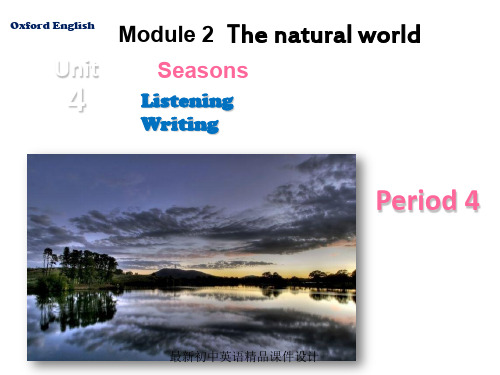
a
b
1
3
c
d
4
2
最新初中英语精品课件设计
B Listen again and complete the table below.
December June
November May
warm dry sunny
cold
最新初中英语精品课件设计
Ask and answer
In pairs, ask and answer the following questions.
最新初ቤተ መጻሕፍቲ ባይዱ英语精品课件设计
B Write a short passage about your favourite season. Follow th example of Mandy’s article.
warm/hot/cool/cold/wet/rainy/windy/cloudy/sunny/snowy
最新初中英语精品课件设计
What are the differences between the four seasons in China and those in Australia?
最新初中英语精品课件设计
Writing My favourite season
A Mandy has written about her favourite season, winter.
south of Australia.
最新初中英语精品课件设计
A Listen to Kelly talking about the weather in Canberra, Australia and put the photos below in the correct order. Write the numbers 1- 4 in the boxes.
牛津深圳初中英语七上Unit 4 Seasons Period 1课件

kidcrky
*Read the poem and find out the rhyme of each verse.
In winter, Watch us go, Making footprints In the snow.
In summer, By the sea, Sandy footprints Made by me.
We use an adjective before a noun to describe a thing or a person.
a bright star a close relative a funny snowman heavy rain
lovely children an old umbrella a warm coat a windy day
But note the spelling change with: sun (n.) → sunny (adj.) fog (n.) → foggy (adj.)
Homework
1. 有感情地朗读What do you know about …? 中的诗歌。
2. 抄写并背诵以下单词: sun—sunny; fog—foggy; fun—funny; rain—rainy; snow—snowy; wind—windy; cloud—cloudy; dirt—dirty
Footprints
spring
In winter
(1)_____________ Watch us go, Making footprints In the snow.
In sprin (2)____g_________
My shoes are wet. See how deep The puddles get.
最新深圳牛津版七年级Unit4详讲及练习.docx
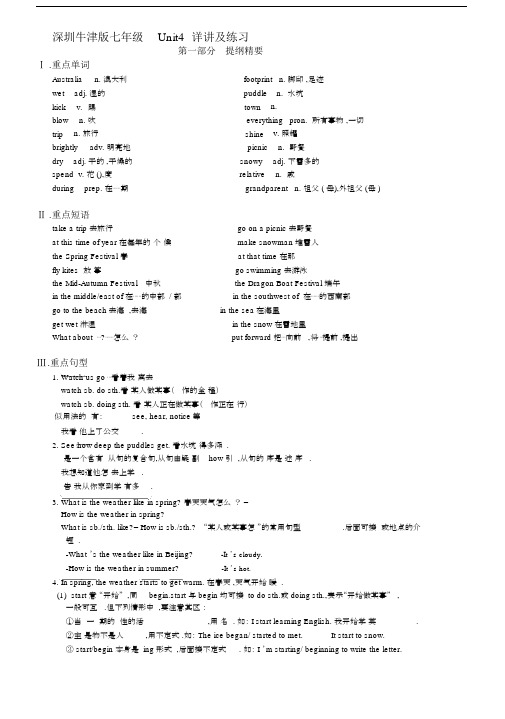
深圳牛津版七年级Unit4 详讲及练习第一部分提纲精要Ⅰ .重点单词Australia n. 澳大利footprint n. 脚印 ,足迹wet adj. 湿的puddle n. 水坑kick v.踢town n.blow n. 吹everything pron. 所有事物 ,一切trip n. 旅行shine v. 照耀brightly adv. 明亮地picnic n. 野餐dry adj. 干的 ,干燥的snowy adj. 下雪多的spend v. 花 (),度relative n. 戚during prep. 在⋯⋯期grandparent n. 祖父 ( 母),外祖父 (母 )Ⅱ .重点短语take a trip 去旅行go on a picnic 去野餐at this time of year 在每年的个候make snowman 堆雪人the Spring Festival 春at that time 在那fly kites放筝go swimming 去游泳the Mid-Autumn Festival中秋the Dragon Boat Festival 端午in the middle/east of 在⋯⋯的中部 /部in the southwest of 在⋯⋯的西南部go to the beach去海 ,去海in the sea在海里get wet 淋湿in the snow 在雪地里What about ⋯?⋯⋯怎么?put forward 把⋯向前 ,将⋯提前 ,提出Ⅲ.重点句型1.Watch us go ⋯看着我离去watch sb. do sth.看某人做某事(作的全程)watch sb. doing sth. 看某人正在做某事(作正在行)似用法的有:see, hear, notice等我看他上了公交.____________________________________________________2.See how deep the puddles get. 看水坑得多深 .是一个含有从句的复合句,从句由疑副 how 引 ,从句的序是述序 .我想知道他怎去上学 .____________________________________________________________ 告我从你家到学有多 .______________________________________________________3.What is the weather like in spring? 春天天气怎么? =How is the weather in spring?What is sb./sth. like?= How is sb./sth.? “某人或某事怎”的常用句型.后面可接或地点的介短 .-What ’s the weather like in Beijing?-It ’s cloudy.-How is the weather in summer?-It ’s hot.4.In spring, the weather starts to get warm. 在春天 ,天气开始暖 .(1)start 意“开始” ,同 begin.start 与 begin 均可接 to do sth.或 doing sth.,表示“开始做某事” ,一般可互 .但下列情形中 ,要注意其区:①当一期的性的活,用名 . 如: I start learning English. 我开始学英.②主是物不是人,用不定式 .如: The ice began/ started to met.It start to snow.③ start/begin 本身是 ing 形式 ,后面接不定式. 如: I ’m starting/ beginning to write the letter.-1-/11我正开始做晚餐了.___________________________________④其后的与想法,感情有关 ,多用不定式 .如: She began/ started to understand it.此外 ,start 有(机器),,身出等含.(2) get 作系 ,意“ 得” ,后常接形容作表 .如: The weather starts to get cool.作 ,意“得到 ,收到”get a letter from sb.= hear from sb. 收到某人来信get表示入或某种状常接形容多用于面中 ,的是由一种状另一种可接形容和名turn的是得和以前完全不一多接形容 ,接名零冠grow指的是地成 ,化的程多接形容 ,也能接去分go多用来表示入某种状 ,多接令人不悦的形容bad, mad, hungry, wrong例: The wind is getting stronger and stronger.Ier.When she saw me, her face turned red.The boy is growing thinner.Eggs soon go bad in hot weather.5. In autumn, everything changes. Leaves turn brown, red or yellow and start falling from the trees.在秋天,一切都会化 .叶成棕色 ,色或黄色并开始从上落 .(1)everything 不定代 ,意“所有事物 ,一切” ,在句中可作主、或表 .everything 作主 ,用数形式. 如: Everything begins to grow in spring.春天万物开始生.金不是一切 .____________________________________________(2)turn+ 色 ,此 turn 系 ,后面接形容 .(3)leaves 是 leaf “ 叶”的复数形式 .leave 做 ,是“离开 ,出”的意思.leave for 前往leave A for B 离开 A 地前往 B 地6. Winter is often cold and snowy.冬天常寒冷多雪.Snowy 形容n.→snow,snow 不可数名“雪” ;作可数名意:“一雪” .snow 可作 ,意“下雪” . It is snowing heavily. 雪正下得很大 .It is a heavy snow.是一大雪.孩子喜玩雪._____________________________________7. People usually spend time with their relatives during the Spring Festival.在春期,人通常都是和戚一起度 .(1)spend “度”,spend time with sb. 意“与某人一起度光”I usually spend my free time with my best friend, Tom.此外 ,spend 有“花 ,用( /金)” ,常与介in/on 用 ,主要用于以下句式:人 +spend+/金 + on sth. “某人花多少/金在某事上”人 + spend+/金 + (in) doing sth.表示“花多少/金做某事”spend all day writing 一整天都在写作spend money on books 花She spends all day (in) learning English.(2)during 介 ,“在⋯⋯期”the Spring Festival= the Chinese New YearDon’tspeak during the meal. 吃 .during 与 in1.作或状的持性用during, 某一作生在某一段中的某一点用in.During the three months he always asks a lot of questions.We usually spend a holiday in July.2.在季名前,用 in 是泛指 ,不用冠;但是用during 是特指 ,要用定冠the-2-/11Children enjoy flying kites in spring.We often go skating during the winter.3.在表示一段的名(如holiday, stay, visit, lesson, meal 等)前 ,一般要用duringI went to see my uncle during my stay in Beijing.暑假我会去看望我的奶奶.____________________________________________8. I love all four seasons. 四个季我都喜.此 all 形容 ,意“所有的 ,全部的” ,修可数名的复数形式或不可数名. 如: He spent all his money.all 的其它用法:(1)all 可与 of 用 ,再接名或代 .接名 ,of 可省略;接代 ,of 不能省略 . All (of) the boysin our class are very tall.我所有人都想去参城 .___________________________________________(2) all 作主的同位,放在 be 之后 ,行之前.We all go to school every day.(3) 作人称代的同位,all 可直接放在些人称代的后面. Our teacher loves us all.(4) all 作副 ,意“都 ,全部 ,完全地” ,主要修形容、副或介短. We are all wrong.9.lovely children 可的孩子lovely 形容“可的 ,美好的 ,令人愉快的” He is a lovelychild.We have a lovely holiday.大部分以ly 尾的副,但是 lovely,friendly,lively,lonely,silly,ugly,likely等形容.10.Marry will get maryied on Monday morning.将在星期一上午婚.get married 意“ 婚”marry 用法小:(1) marry sb 表示嫁某人;与......婚 . 如: John married Mary last week. 上周翰和婚了.(2)be/get married to sb 表示与某人婚 .如: Jane was married to a doctor last month. 上个月和一位医生婚了 .斯和一位教婚了 ._____________________________________(3) marry sb to sb. “父母把女儿嫁某人或儿子娶媳.”如: She married her daughter to a businessman.她把女儿嫁了一位商人.(4)marry 作不及物 ,往往用副或介短来修 .如: She married very early. 她很早就婚了.(5) marry一般不与介with 用 .如:她和一位英国人了婚.She married with an Englishman. 【】【正】: She married an Englishman. / She was / got married to an Englishman.(6) 若某某是否婚,而不涉及婚的象,可用 be / get married 的形式 ,相当于系表构.如:你婚了? Do you marry?/ Have you married? 【】【正】: Are you married? / Have you got married?11. go swimming 去游泳go+-ingMy elder brother often goes swimming on Sundays.常搭配: go fishing, go shopping, go boating, go dancing, go skating,go climbing12. The clocks in all public places in the UK are put forward an hour, from 1 a.m. to 2 a.m.英国所有公共所的表被向前了一个小,从一点到两点 .本句含有被,即主是所表示的作的承受者.构: be+去分put forward “把⋯⋯向前”You can put your watch forward ten minutes.此外 ,可表示:(1)向前移: Why don ’tyou put your chair forward? 你什么不把椅子往前挪一点?(2)将⋯⋯提前:我不得不把会提前.___________________________________________-3-/11(3) 提出: Please put forward a new plan. 请提出一新的计划.词汇练习一、英汉互译1. go swimming __________2.fly kites __________3. take a trip __________4.have a picnic ___________5.make snowmen __________6.start doing sth __________7.during the day __________8.have a lot of fun __________9.去海边 __________10.去野餐 __________11.结婚 __________12.和某人一起渡过 __________13.在寒假期间 ___________14.变暖 __________15.在春天 _________16.在一年的这个时候 __________二、根据下列句子的首字母提示,完成句子1.It snowed yesterday, e_________ is covered with the white snow outside now.2.We will take a t__________ to America this summer.4.Did he _________ the whole day doing homework with his mother ?5.Winter is often cold and s_________, but I like it most.6.Which s_________ do you like best, spring, summer, autumn, or winter ?7.Many people like to go to the b________ and swim in the sea.8.My home is half a k_________ away from here.9.Leaves t__________ yellow in autumn.10.The w_________ is hot in summer.三、根据句意及汉语提示写单词,补全句子 .1.It is very______________( 湿润的 ) on the ground. People are easy to fall over.2.He lives in a small____________( 镇 )and he is very poor.3.It is very cold. And the wind_______________(吹)strongly.4.It is always __________( 干燥的 )in the north-west of China.5.__________________( 在 ...期间 )this holiday. I visited two foreign countries.四、根据汉语提示,补全句子 .1.我希望我们寒假能一起去旅行.I hope we can____________ _____________ ____________ together in the winter holiday.2.冬天 ,孩子们经常一起在地上堆雪人.Children often ________ _________ together on the ground in winter.3.冬天去哈尔滨旅游是一件令人兴奋的事.__________ __________ ____________ ___________ travel to Harbin in winter.4.有空的时候汤姆总喜欢跟亲戚待在一起聊聊天.Tom usually _____________time _____________his ___________and talks with them When he’ s free.5.在春天 ,一切事物都变绿了._________ _________ green in Spring.6.每年的这个时候天气总是很冷.It ’ s always cold___________________ _________ __________ _____________.-4-/11Ⅳ .重点语法形容词形容词在句中主要作定语,表语 ,宾语补足语 .(一)作定语:修饰或限制名词或不定代词或疑问代词,或疑问副词 .1.前置定语:形容词修饰或限制名词,一般放在它所修饰或限制的名词之前.(1)One New Year ’ s Day, we put on ournew clothes.(2)I want to make some American friends.(3)Liu Sanzi is an eight-year-old boy.(其中 eight-year-old 叫复合形容词,其构成形式是:“数词 +名词 +形容词” ,中间加连字符)▲提示:有的形容词只能作定语(不能作表语),如:little(小的),only(唯一的),wooden(木质的),,woolen(羊毛质的 ), elder(年长的 ).如:(4). My elder brother is in Beijing.(正)My brother is elder. ( 误 )2.后置定语(1) 形容词修饰或限制不定代词(something, anything, nothing, everything), 常放在不定代词之后.I have something important to tell you.I don’ t wantanything else.(2) else 修饰或限制疑问代词(who, whom, what 等 )或疑问副词时 ,通常放在疑问代词或疑问副词之后.What else do you want?Where else are you going to visit?(3)enough 作定语修饰或限制名词时 ,放名词之前;修饰形容词时 ,放形容词之后 .Pandas will have enough food to eat.Your English is wonderful enough.(二)作表语:放在连系动词之后,常见的连系动词有四种:1. be 动词Planes will be very large.Running is tiring.2.感官连系动词feel( 摸起来 ), look/seem ( 看起来 ), smell( 闻起来 ), sound (听起来 ), taste (尝起来 ).Cotton feels soft.3. “变化”连系动词:.The fish went bad.Trees turn green4. “持续、保持”连系动词:keep, stayPlease keep silent.Mr Jackson stayed cool.▲提示:有的形容词只能作表语 (不能作定语 ),特别是以 a-开头的形容词 ,如: afraid 害怕 , alone 独自的 , asleep 睡着的 , awake 醒着的 ,alive 活着的 (有时可作后置定语 ), well 健康的 , ill 病的 , frightened 害怕的如: The man is ill. ( 正 )The ill man is my uncle.( 误 )(三)作宾语补足语:常放在宾语的后面,用来补充说明宾语的性质,特征或状态 .We paint doors and windows red.His voice made him famous all over Europe.What made you so interested in music?(四)作主语或宾语1.形容词前加定冠词the,表示某一类人或物.在句中作主语或宾语,作主语时 ,谓语动词要用复数.如:the old,the young, the rich, the poor, the blind 等 .The rich should help the poor.2.表示国家和民族的形容词前加上定冠词the,表示这个民族的整体.在句中作主语或宾,作主语时 ,谓语动词要用复数 ,如: the British, the English, the French, the Chinese 等 .The English have the sense of humor.(五)使用形容词的几个常用句型-5-/111. It is + adj. (for sb.) + to do sth.“对某人来说做某事是怎样的.”常用形容词:dangerous (危险的 ), difficult ( 困难的 ), easy (容易的 ), hard ( 艰难的 ), important ( 重要的 ),impossible ( 不可能的 ), interesting ( 有趣的 ), necessary(必要的 ), pleasant(舒适的 ), safe(安全的 ), useful( 有益 / 用的 )等It is difficult to see and hear at the back.It is important for Liu Sanzi to work on his father’ s farm.学生认真听老师讲课是非常必要的.______________________________________________▲提示:避免句子头重脚轻,其中 It 做形式主语 ,不定式才是真正主语,翻译时先译不定式.2. It is + adj. + (of sb.) to do sth.“某人做某事是怎样的.”It ’s very kind of you to help me.It ’ s foolishof him to go alone.▲提示:这一句型中常用描述行为者的性格、品质的形容词.如 careful( 细心的 ), careless(粗心的 ),clever( 聪明的 ), foolish( 愚蠢的 ), good(好的 ), kind( 友善的 ), lazy( 懒惰的 ), nice(友好的 ), polite( 有礼貌的 ),right( 正确的), wrong( 错误的 ) 等.3.形容词 +不定式a.表示感情或情绪的形容词后面常接不定式,这样的形容词有: glad(高兴的 ), pleased(高兴的 ), sad(忧伤的 ),thankful( 感激的 )等 , 如:I’m glad to see you.I ’ m verysad to hear the bad news.b.表示能力和意志的形容词,如able(有能力的), certain(一定), ready(乐意的,有准备的),sure(一定)等常接不定式 .如:He is able to swim.Lily is always ready to help others.He is sure to get to school on time.语法练习一、单项选择1.I had a hard time with math and I wasn't ______to get the bad report from my math teacher.A.sureB.surprisedC.excited2.Tom is not good at math. He always feels ______before he takes a math test.C.nervousD.proud3.-I'm going to a job interview. I feel a little_______.-Take it easy. Listening to music can help you relax.A. B. nervous C. excited4.-Are you scared of the flight?-No, just a little ________.A. angryB. seriousC. anxiousD. calm5. -Waiter, $20 for dinner, right?-I'm afraid, $25, sir, for drinks are ________.A. extraB. freeC. highD. spare6.-Excuse me, sir. The shoes are a bit small for me.-Don't worry. I'll change them for a________size.-6-/11A. smallerB. smallestC. largerD. largest7.-Peter has good grades in all his subjects, but he never shows off.-I agree. He is very _________.A.easy-goingB.imaginativeC.modestD.generous8. You can't sneeze and keep your eyes _______ at the same time.A. openB. opensC. openedD. opening9. My dog is gentle and never bites. So you needn't be_______.A.excitedB.frightenedC.satisfiedD.interested10.-Our teacher wants us to be_______when we talk with the foreigners.-Yes, we should believe in ourselves.11. -Which do you like ________, tea, coffee or juice?-Coffee.A.goodB.betterC.bestD.well12.-I'm ______, mum. Can I have something to drink?-OK. Here's some cola.A. fullB. heavyC. hungryD. thirsty13.-Lin Tao, why are you so________?-Because Wang Meng got three gold medals at the Winter Olympics.A.excitedB.angryC.disappointed14.-What do you think of the sweater?-It's too _________, and I don't have enough money to buy it.A. niceB. lovelyC. popularD. expensive15.-Why are you unhappy, Ben?-I was late for class again, I'm afraid Miss Li will be _______ me.A. friendly toB. angry withC. busy withD. proud of16. He was so _______when he heard the _________ news that he got the first prize in the contest.A. exciting, excitingB. exciting, excitedC. excited, excitedD. excited, exciting17. All of us want to do more work with ________ time and __________ workers.A. fewer, lessB. less, fewerC. more, muchD. less, more18.-What do you think of the entertainment show you saw last night?-It's so _______that I want to see it again.A.excitingB.boringC.tiring19.-Andy, you were the only person that was late for the meeting, why?-Sorry, sir. But I really had a __________ time finding the meeting hall.-7-/11A. enjoyableB. funnyC. difficultD. pleasant20.Mr Brown always makes his class _______ and keeps his students _______ in class.A. alive; interestingB. lively; interestingC. alive; interestedD. lively; interested21.That film was so _________ that most of the audience kept screaming in fear while watching it last night.A. excitingB. frighteningC. boringD. amazing22.-Congratulations! Your English teacher told me you got an A this time.-Thank you. She is very ___________.A. impressedB. embarrassedC. terrifiedD. frustrated23.-Mum, I'm really ________ about the result of the exam.-Cheer up. I believe you can be successful.A.patientB.satisfiedC.unhappyD.pleased24.We will have a field trip this afternoon. The news makes everyone________.A.excitedB.frightenedC.happilyD.luckily25.-What do you think of the lecture of Li Yang's Crazy English?-I think it's _________, but someone thinks it's much too ________.A. wonderful enough; boredB. enough wonderful; boringC. wonderful enough; boringD. enough wonderful; bored26.The shop ________ at 8:00 a.m. and it ________ for ten hours every day.A. opens; is openB. is opened; opensC. is open; has openedD. opened; opens27.Marsha thought her friends would do something __________ to celebrate her birthday, but they just gave hera birthday card.A. correctB. honestC. quickD. special第二部分综合训练一、用括号内动词的适当形式填空.1.He often(have) dinner at home.2.Daniel and Tommy(be) in Class One.3.We(not watch) TV on Monday.4.Nick(not go) to the zoo on Sunday.5.they(like) the World Cup?6.What they often(do) on Saturdays?7.your parents(read) newspapers every day?8.The girl(teach) us English on Sundays.9.She and I(take) a walk together every evening.10.There(be) some water in the bottle.11.Mike(like) cooking.12.They(have) the same hobby.13.My aunt(look) after her baby carefully.-8-/1114.You always(do) your homework well.15.I(be) ill. I’ m staying in bed.16.She(go) to school from Monday to Friday.17.The child often(watch) TV in the evening.18.Su Hai and Su Yang(have) eight lessons this term.二、单项选择1.In this five-person game, the one who finds ________ hidden balls will win the last free ticket for the movie Born Player.A. manyB. someC. the moreD. the most2. _______ all the students in his class, Xiao Ming writes ________.(2010三亚)A. Of, most carefullyB. In, the most carefullyC. Of, very carefullyD. In, much more carefully3.Though his grandmother lives ________, she never feels__________. (2010 江苏无锡市)A. alone, aloneB. lonely, lonelyC. alone, lonelyD. lonely, alone4.-It seems that Alice never wants to do anything except draw pictures.-Right. That's what she likes to do ________. ( 2010 安徽)A. moreB. lessC. mostD. least6. The modern Olympics started in Athens, Greece. Its motto is___. ”( 2010“龙岩市)A. Fast, high, strongB. Faster, higher, strongerC. Fastest, highest, strongest7. -What do you think of the cake?-I like it very much. It tastes __________.(2010湖南娄底市)A. goodB. terribleC. well8.The Internet is very useful for us. We can find information. ( 2010 河北)A. easyB. easilyC.hardD.hardly9.Sometimes walking is even than driving during the busy traffic time. ( 2010 河北)A. fastB. fasterC. slowD. slower10. -I don ’ t have enough money. This watch is too expensive.-Look, there are some more over there. They ’ re ______ and (nice2010. 重庆市)A. bigB. oldC. smallD. cheap11.-Which province is the ________ one in winter? — It should be Hainan Province, I think. ( 2010 湖北荆州市)A.coldestB. hotterC. warmestD. cooler-9-/11三、完形填空四、阅读理解-10-/11五、补全对话-11-/11。
- 1、下载文档前请自行甄别文档内容的完整性,平台不提供额外的编辑、内容补充、找答案等附加服务。
- 2、"仅部分预览"的文档,不可在线预览部分如存在完整性等问题,可反馈申请退款(可完整预览的文档不适用该条件!)。
- 3、如文档侵犯您的权益,请联系客服反馈,我们会尽快为您处理(人工客服工作时间:9:00-18:30)。
1. junior high school
2. on foot 3. take part in
初中
步行 参加
4. have a good time 5. learn about…
过得愉快 学习…;了解…
6. be close to… 7. daily life
在……附近 日常生活
C. his students
D. his friends
4. Tom and Jack take part in the school _____ practice. A. basketball
B. swimming
C. band D. drawing
短语收藏夹 Phrase collection
第四期
词语点将台 Word power Unit 2 词语笔记
break 【展示】 1. She always works all day without a break. 她经常工作一整天都不休息。
2. Please go to see the teacher at break. 请在课间休息时去见老师。 3. Take care not to break the plate. 小心点别打碎了盘子。
操练场:
根据句意从上面选择适当的短语并用正 确形式填空,补全句子。 1. My father teaches English in a junior high school ___________________. have a good time 2. We usually __________ at Sam's party. 3. Do you want to learn about ____________the Chinese geography?
2. 这家餐馆的饭菜很好吃,所以我经常 过去吃晚饭。 The food in this restaurant is very so delicious, _____ I often go there to have _____. _____ dinner
3. 孩子们喜欢在操场上玩。 enjoy playing Children _____ ______ on the playground. 4. 这个女孩很聪明。 is _____ clever this girl _____! How
ring 【展示】 1. Students run out of the classroom as soon as the bell rings. 铃声一响,学生们就跑出教室。 2. Please tell John to ring me up later. 请告诉约翰过一会给我打电话。 3. There is a ring at the door. 门铃响了。
Unit 2 听力基础训练(一)
I. 听对话,根据对话内容选择最佳答案。 对话念两遍。 听第一段对话,回答第1小题。 1. What does Tim like to do at the weekend? A. Play games. B. Clean the room. C. Watch TV.
听第二段对话,回答第2-3小题。 2. What does the boy want to do in the afternoon? A. Go shopping.
B. Go swimming. C. Go skating.
3. What's wrong with the girl's mother? A. She is busy.
句式仿写 Structure imitation 1. I enjoy learning about different places in the world. 我喜欢了解世界上不同的地方。
【解析】enjoy用作动词,意为“喜欢”, 后边常接名词表示“喜欢……”,接动名 词意为“喜欢做…….”。如:
3. Computers play an important role in aily our d_____ life. reak 4. There is a ten-minute b _____ between classes.
【解析】此句是一个感叹句。由“How+ 形容词+主语+谓语!”构成。 How beautiful these pictures are! 这些照片真漂亮! How large your room is! 你的房间好大啊!
【跟踪练习】 根据汉语提示,完成句子。
1. 冬天到来,天气变凉。 when The weather turns cold _____ the winter comes _____.
My friend Mary enjoys her job in that company. 我朋友玛丽喜欢她在那家公司的工作。
He enjoys playing table tennis with his father. 他喜欢和他的爸爸打乒乓球。
2. How short it is! (课间休息)时间真短啊!
【运用】 根据汉语意思,完成句子。
5. 这个节目通常以一首著名的歌曲结束。 ends with This show usually _____ _____ a famous song.
6. 他打算最后讲一个笑话。 end by _____ He'd like to _____ _____ telling a joke.
【总结】break既可用作名词,也可用 作动词。用作名词,意为“休息;间 歇”,如例1;也可以直接表示“课间 休息”,如例2;构成短语有take a 休息一下 break,意为“_________”;break用作 例3 动词时,意为“打碎;打破”,如 _____。
【运用】 根据汉语意思,完成句子。
C. Dumplings.
II. 听一段独白。请根据题目要求,从 所听到的内容中获取必要的信息,填 入下面的信息采集表中。独白念两遍。 School life Lunch Rich (丰富的) and colorful. There are many kinds of food but they are not very delicious (A) ________. I often (B)take a walk and _________ talk with my friend.
3. 教堂的钟每天响两次。 bell _____ The church _____ rings twice a day. 4. 我姐姐现在不在,你今天晚上给她再 打电话好吗? My sister isn't here now. Could you ring her back _____ _____ _____ this evening?
【解析】此句中,when the bell rings做 主句的时间状语。 如:My father often helps my mother cook dinner when he comes home early. 我爸爸回家早的时候,经常帮我妈 妈做晚饭。
2. My school is close to my home, so I always go to school on foot. 我家离学校很近,因此我总是步行上学。 【解析】此句中,so引导结果状语从 句,表结果。 如:Next Monday is my mother's birthday, so I want to buy a present for her. 下周一是我妈妈的生日,所以我想 买个礼物给她。
After lunch
Noon break After school
We often keep quit and have a rest (C) _________. Some students do some cleaning because they on duty are (D) _______, some play sports and others go home (E) ________.
精品课文 Close reading 走进课文 Into the text 根据Reading的内容,选择最佳答案。 1. The article talks about the writer's day _____. A. at school B. at home C. at the office D. in the park
句型导航 Sentence guide
长难句解析 Structure analysis 1. When the bell rings, I run to the playground with my best friends Tom and Jack. (下课)铃响了,我和我的好朋友汤姆、 杰克一起跑去操场。
2. The writer _____ to school.
A. rides a bicycle
B. walks C. takes a bus
D. drives a car.
3. The writer often plays games with _____ during the morning break. A. his parents B. his brothers
4. I often go to the park near my house on foot ______ on Sundays. take part in 5. I'd like to ___________ that basketball game.
6. Can you tell me something about your daily life ________?
B. She is ill.
C. She is kind.
